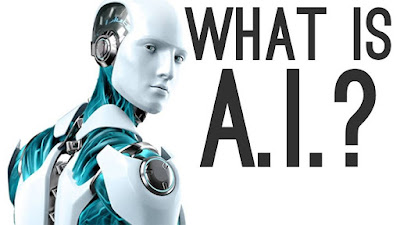 |
Artificial intelligence (AI) is the intelligence that is exercised by machines, as opposed to the natural intelligence of human pets. AI research is based on the way experts think about the study, which refers to any system that understands its environment and takes actions that are more likely to achieve its goals. .
The term "artificial intelligence" was previously used to describe machines that mimic and display "human" cognitive skills that are characterized by human cues, such as "learning" and "problem solving". This definition has since been rejected by mainstream AI researchers who now define AI in terms of rationality and acting rationally, which does not limit how intelligence can be defined.
 |
| By Google |
AI applications include advianced web search engines (e.g. Google), customization systems (used by YouTube, Amazon and Netflix), human voice understanding (e.g. Siri and Alexa), self-driving cars (e.g. Tesla) involving automated decision making. and strategic game systems (such as chess.
As machines become more capable, tasks that require "intelligence" increasingly move away from the definition of AI like a moving map. For example, optical character recognition is often excluded from what is considered AI in what has become a mainstream technology.
The foundation of artificial intelligence was stated as an academic discipline and question in 1956, and has since met several waves of hope in the losses followed by logical and alternative exchanges (known as "AItron"). ), followed by new methods, success and renewed ticketing. AI research has so far tested and rejected a variety of conditions, including brain simulation, human problem solving, formal logic, large knowledge databases and simulating animal behavior. In the first battles of the last 21 climbs involved, highly mathematical statistical machine learning dominated the field, and the technique proved to be highly effective, solving very difficult problems throughout industry and academia.
Meditation on the use of specific and specialized tools for different levels of research. Traditional AI research goals include reasoning, knowledge planning, learning, natural language processing, cognition, and the ability to manipulate and manipulate energy. General intelligence (the ability to solve arbitrary problems) is among the long-term goals of the field. To solve these problems, AI researchers have advanced and approached problem-solving techniques - search and mathematical optimization, formal logic, artificial neural networks, and statistics, parts and economics. Straightforward methods. AI also draws on computer science, linguistics, linguistics, philosophy, and many other fields.
The field was founded on the assumption that human intelligence "can be described so precisely that a machine can imitate it". It has given rise to philosophical arguments about the mind and the moral consequences of creating human-intelligent artificial beings.
These issues have been addressed in myth, legend, and philosophy since ancient times. Computer scientists and philosophers have since suggested that AI could become an existential rationality for humans if its capabilities were not dictated by admirers.
Great information
ReplyDeleteAmazing post😎
ReplyDeleteKeep it up good work
ReplyDelete